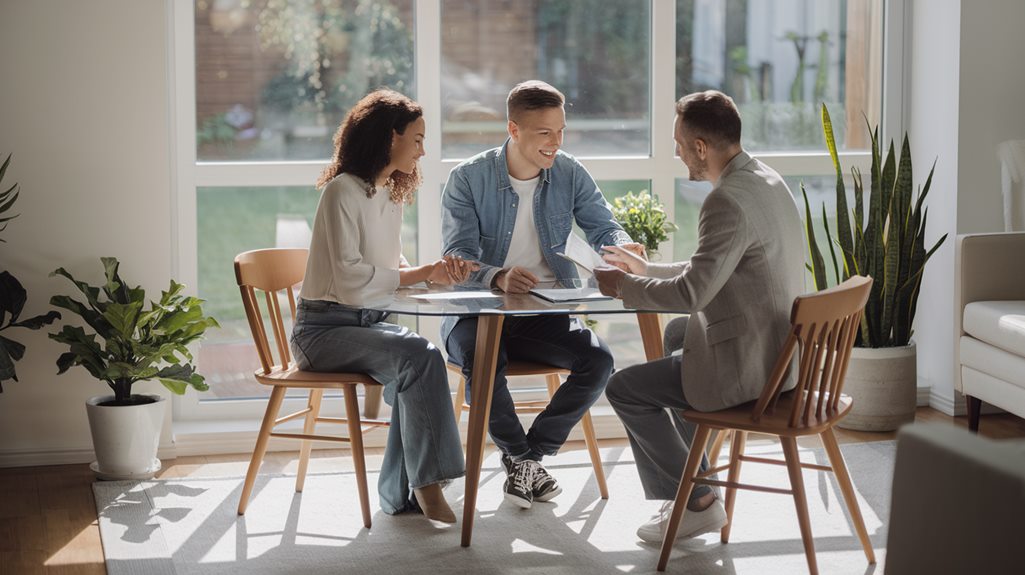Buying your first home can be exciting and a little scary, but you can do it! First, check your money situation. Look at your credit score and how much debt you have. This will help you when you talk to the bank.
Next, make a budget. Write down how much money you earn and how much you spend. This will help you figure out how much you can spend on a house.
Then, learn about different ways to pay for your home. Getting a mortgage pre-approval is a smart step. It shows sellers that you are serious.
Think about where you want to live. Look for places with nice parks, schools, and shops.
It's also a good idea to find a real estate agent. They know a lot about the local market and can help you find homes that you might like.
When you visit homes, think about what you need now and in the future.
Once you find a home you like, make an offer.
Finally, learn about the closing steps so you know what to expect when buying your home. There are many tips and tricks to help you along the way!
Ready to start building equity in your own Michigan home? Get your personalized home loan quote today.
Assess Your Financial Situation

Before you buy a house for the first time, it's very important to understand your money situation. Start by checking your credit score. This number can affect how much you pay for a loan.
Make sure your job gives you enough money to pay for a home and other bills. It's also important to manage your debts. Try to pay off what you owe so you look better to banks.
Save some money for emergencies. This way, if something unexpected happens, you won't lose your new home.
Think about other costs you might have, like fixing things or paying for a homeowners' association. These costs can change how much money you have left.
Michigan residents, unlock the door to your new home. Request your home loan quote from Treeside Financial today.
Determine Your Budget
To figure out how much money you can spend, start by adding up all the money you make each month after taxes.
It's important to know your finances well, especially when it comes to expenses and planning your budget. Think about your savings and how to prepare for any surprise costs that might come up.
Also, consider how buying a property might change your life. Look at what similar homes are selling for in the area to see if it's a good price for you.
Don't forget to think about things like how long your commute will be and what fun things are nearby.
You should also think about whether the property will still be good for you in the future as your needs change. Focus on places that match your goals.
A smart budget helps you feel calm and confident, making sure you find a home that fits your dreams.
Explore Financing Options

When you're looking at ways to pay for a home, it's important to check different mortgage rates. This helps you find the best deal.
There are different types of loans, like fixed-rate and adjustable-rate mortgages. Knowing what these mean can help you pick the right one for your money goals.
Also, think about how much money you can put down at the start. This can change the loan terms and how much you pay each month.
Compare Mortgage Rates
Buying your first home can feel a bit scary, especially when it comes to figuring out mortgages. But don't worry! Comparing mortgage rates is a key step to getting the best deal. Interest rates can change a lot, so using mortgage comparison tools is super helpful.
Make sure to check out the lenders you're thinking about. A good lender will be reliable. You'll also need to decide if you want a fixed rate, which stays the same, or an adjustable rate, which can go up or down. This choice can change how much you pay each month.
Your credit score is important too. It affects what offers you'll get. Watch out for hidden fees that can pop up, so read everything carefully. If you're a first-time buyer, look for special programs that might help you save money.
Online mortgage calculators make it easier to see your options. And don't forget about local lenders! They can give you personal help.
| Aspect | Consideration | Benefit |
|---|---|---|
| Interest Rates | Fixed vs Adjustable | Stability vs Flexibility |
| Lender Choice | Local Lender Benefits | Personalized Service |
| Tools & Calculators | Online Mortgage Calculators | Easy Comparison and Estimates |
Understand Loan Types
Choosing the right type of loan is an important step when buying a home. There are different loans to fit different needs. A fixed-rate mortgage means your payments stay the same every month, which can help you plan your budget.
An adjustable-rate mortgage starts with lower payments, but they can change later on.
If you have a lower credit score, you might want to look at government-backed loans. They can be easier to get than regular loans. It's also important to think about how much interest you'll pay and how long you want to take to pay it back.
Your debt-to-income ratio is another key factor in getting a loan. It shows how much money you owe compared to how much you earn. This can affect the terms of your loan and if you need mortgage insurance.
Assess Down Payment
Saving for your down payment is a big part of buying a home. It can change how much money you can borrow and what your monthly payments will be.
First, take a look at how much money you save each month. Can you set aside a little more? If saving is tough, there might be programs near you to help. These programs can give you money or low loans to make things easier. Knowing about these options can help you feel more confident and connected to your community.
Get Pre-Approved for a Mortgage
Getting pre-approved for a mortgage is an important step if you want to buy a home. It shows sellers that you're serious about buying.
To get pre-approved, you'll need to gather some important papers, like proof of how much money you make and your credit history. This will help make the process easier.
When you get pre-approved, you'll know how much you can spend. This can help you when you make offers on homes.
Financial Documents Required
Getting ready for a mortgage can be a little tricky, but knowing what papers you need helps a lot! First, check your credit report. It shows how good you are at handling money, and it's really important. Lenders want to see that you earn money, so have some recent pay stubs and tax returns ready. They will also want to know about your job history to see if you have a steady job.
Don't forget to gather your bank statements and details about your savings. If you have other things like investments, those are good to show too! It helps lenders understand how much money you owe compared to how much you make. This is called your debt-to-income ratio, and it helps them see if you can handle a loan.
Here's a quick list of the papers you will need:
| Document Type | Purpose | Importance |
|---|---|---|
| Credit Report | Shows how you handle money | Very Important |
| Income Verification | Confirms how much you earn | Very Important |
| Tax Returns | Shows your earnings over time | Important |
| Employment History | Proves you have a steady job | Important |
| Bank Statements | Shows you have money saved | Necessary |
Make sure to gather all these papers. They will help you make a strong case for your mortgage!
Benefits of Pre-Approval
Buying a home can feel a bit scary, but getting pre-approved for a mortgage can make it easier. When you get pre-approved, you learn how much money you can borrow. This helps you feel more sure about what you can afford. It also makes you someone sellers want to talk to.
Here are some good things about getting pre-approved:
- Know Your Budget: When you know how much you can spend, it helps you look for homes that fit your wallet.
- Stronger Bargaining: Sellers like buyers who are pre-approved. This can help you get a better deal.
- Faster Process: With pre-approval, getting your mortgage goes quicker, which can make buying a home less stressful.
Define Your Desired Location

When you buy a home for the first time, picking the right place to live is super important.
Think about what you like in a neighborhood. Do you want parks, shops, or places to eat nearby? These can make your home more enjoyable.
It's also important to see if you can get around easily. Good transportation helps you get to work or school without any trouble.
Check if there are any new buildings or roads planned that might change your area in the future.
Safety is another big thing. A safe community helps you feel secure and happy.
If you have kids, look for good schools nearby. This helps them learn and grow.
Try to learn about the local culture. It's nice if it matches what you enjoy.
Don't forget about zoning rules, too. These rules tell you what you can do with your land, which is important if you want to make changes later.
Choosing the right location is key to loving your new home and making a good investment!
Research the Property Market
To make good choices about buying property, it's important to look at what's happening in the market right now.
Check out places that might grow in the future. This will help you find the best spots to invest your money.
Also, knowing how prices change will help you talk about money better and make sure you don't pay too much.
Analyze Market Trends
If you want to buy a house for the first time, it's important to understand what's happening in the real estate market. By looking at different things, you can make smart choices and feel good about your investment.
Here are some things to think about:
- Market signs: Check how many people want to buy houses, look at past prices, and see how the economy affects the market.
- Season changes: Notice how people buy homes at different times of the year. This can change how many houses are for sale and their prices.
- Neighborhood features: Look at the local area to see if it's growing, what fun things are nearby, and if it will be a nice place to live in the future.
By thinking about these things, you can understand the real estate market better.
You'll learn how changes in the market can help you decide when and what to buy. This way, you're not just buying a house, you're also choosing a great place to live!
Identify Key Locations
Now that you've looked at market trends, it's time to find good places to buy a home. Start by checking out lively neighborhoods in the city. These areas often have fun things to do and easy ways to get around.
If schools are important to you, look at how good the local schools are. Think about what's nearby, like parks, stores, and places to enjoy art and culture. These can make your new home much better!
Also, look for news about new buildings or parks coming soon. They can help your home become worth more in the future. Safety is very important, too. Check out crime rates and see if there are neighborhood watch groups.
Look for places where lots of people want to live, but remember to check the rules about how you can use your property. Choosing the right place to live can help you feel happy and secure in your home.
Understand Price Dynamics
Have you ever thought about how changes in the economy can affect home prices? It's really important for new buyers to understand this.
When the market changes, it can change how much a house is worth. By looking at different signs in the economy, you can learn how to guess future prices and become a smarter buyer.
Knowing what people in your area want can help you when making deals. Here are some things to think about:
- Market Changes: Watch how the economy changes the value of homes over time.
- Economic Signs: Look at interest rates, job numbers, and how the economy is doing. These things can help you see if investing is a good idea.
- Local Needs: Check out how many people are moving to your area and what kind of homes they need. This can help you find good places to buy.
Engage a Real Estate Agent

When you are ready to buy a home for the first time, it helps to have a friendly real estate agent by your side. They know a lot about the market and can help you make smart choices. An agent can tell you about home prices and what is happening in the area, which is super helpful.
| Benefit | Description |
|---|---|
| Market Knowledge | They know the local area really well! |
| Negotiation Skills | They can help you get a good deal! |
| Time Savings | They make finding a home faster and easier! |
Visit and Evaluate Properties
Choosing the right home is important. As you start looking, think about what you need and what'll help you in the future.
When you visit a property, check how it looks and how it could work for you. Don't forget to look at the neighborhood, too. Good nearby parks, schools, and shops can make your life better.
Here are some things to remember when you visit:
- Safety and strength: Make sure the building is strong and safe, not just pretty.
- Nearby places: It's good to be close to schools, stores, and buses.
- Future growth: Areas that are getting new buildings can be worth more later.
Take your time to make sure the place is right for you now and in the future.
Make an Offer and Negotiate

Making an offer and negotiating can be fun but also tricky for people buying a home for the first time. It's really important to have a good plan for your offer. Think about what's happening in the market, what other similar homes have sold for, and how the home you want looks. Use smart negotiation skills to be strong but also be willing to compromise. This way, your offer fits both your money goals and what the seller wants.
| Aspect | Things to Think About | What to Do |
|---|---|---|
| Offer Plan | What is happening in the market | Look at home sale data |
| Negotiation Skills | What the seller cares about | Talk clearly and kindly |
| Budget Matching | How much money you can spend | Change your offer if needed |
Finalize the Purchase Process
Finalizing the purchase of your new home is an important step. It's like putting the last piece in a puzzle. You need to pay close attention and understand everything involved.
First, look over the purchase agreement. Make sure it includes everything you talked about.
Next, think about the closing costs. These are extra fees, like title insurance and homeowner's insurance.
Don't forget to do a final home inspection. This helps you check that the house is in good shape.
Once everything is done, you'll have new responsibilities. You'll need to manage your property taxes and plan how to move into your new home.
- Check that your title insurance is correct to avoid problems later.
- Schedule a home inspection to catch any repairs you need to make.
- Get homeowner's insurance early to keep your new home safe.
Taking these steps carefully will help you move smoothly into your new neighborhood.







